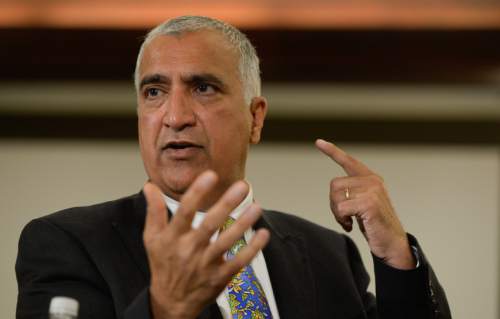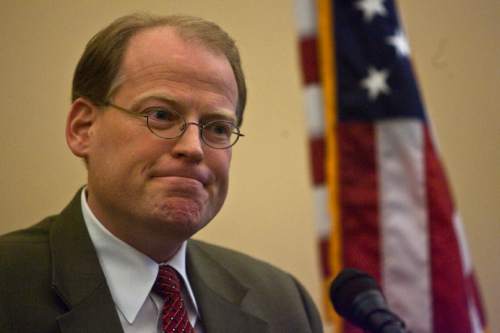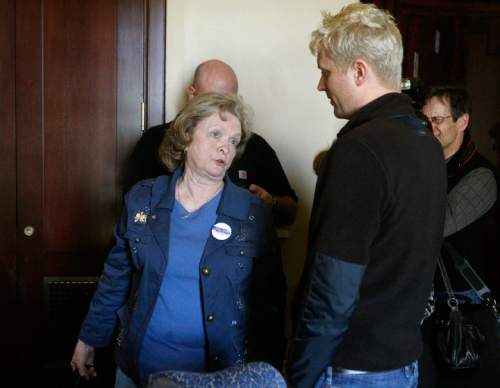This is an archived article that was published on sltrib.com in 2016, and information in the article may be outdated. It is provided only for personal research purposes and may not be reprinted.
In the wake of the U.S. Supreme Court ruling that legalized same-sex marriage in every state, Rep. Kraig Powell wants to repeal the Utah Constitution's ban on such unions and to scrub scores, if not hundreds, of references to the now-defunct policy in state statutes.
"Words matter," says Powell, a Heber City Republican and attorney. "The current state of the law is a certain way and if that is not reflected in our statutes, then I believe it could have unintended or detrimental consequences by leaving outdated language in place."
Powell will have a fight on his hands. And, if history is a guide, he'll likely lose.
Utah law is riddled with obsolete laws that have hung on for decades in symbolic denial of reality. Many of them have to do with traditional views of morality.
Fornication, under Utah law, is a class B misdemeanor, punishable by up to six months in jail.
The same is true for adultery and sodomy outside of marriage.
Utah also makes crimes of some nonsexual activities that have roots in moral taboo: Auto dealers are banned from selling cars on Sundays, and Utah is one of just two states (Hawaii is the other) that outlaw all forms of gambling — including lotteries, raffles, and wagers on horses, sports and even elections. All are Class B misdemeanors.
Another law prohibits uttering "obscene, profane or vulgar" remarks on a bus, or riding a bus while under the influence of drugs — but not alcohol. Either crime is classified as a Class C misdemeanor carrying a possible 90-day jail term.
State law on alcohol is rife with strict proscriptions and prescriptions. Think Zion curtain.
Sporadic attempts have been made to weed out obsolete laws. Fifteen years ago, then-House Speaker Marty Stephenson led an effort to wipe out some 55 pages of code. Last year, Rep. Lee Perry, a Box Elder County Republican and Utah Highway Patrol lieutenant, successfully repealed some deadwood traffic laws, including a mandate for motorists to honk when rounding blind curves.
None of those efforts involved morals-based law.
—
Buzz saw • Former Republican lawmaker Dave Ure found out how difficult such an endeavor could be when in 1997 he tried to repeal the prohibition on sodomy between consenting adults.
"I kind of hit a buzz saw on that one," says Ure, now director of the state agency overseeing state school trust lands.
Opponents reasoned "if you take it off the books, it encourages more people to participate," he says, disputing the logic in that.
Ure notes the criminal ban on fornication and adultery. "That's stopped a lot of people, hasn't it?" he asks rhetorically.
Ure's repeal legislation never even made it to committee before he gave it up as doomed. (The law later was relaxed so as to exempt married, consenting adults.)
Powell, who is still drafting his proposed repeal of the same-sex marriage ban, knows the task he's embarked on isn't an easy one, particularly when it comes to amending the Constitution, which requires two-thirds legislative approval followed by a vote of the people.
"I can understand that there are some people who would want to leave the language as it is, and go on practicing a different law than is on the books," he says. "It does not seem to me that that is the most responsible approach. … I think it's more responsible for us to step in and address [these issues], no matter how controversial they may be in certain circumstances."
His main impetus, Powell says, is to get the Legislature to step up and make policy decisions on a whole range of related issues, from adoption to surrogacy to the information on birth certificates and more.
"If we don't make these decisions at the Legislature, then the courts are going to be making them for us, but they're really going to be guessing at what the policy preference of the democratic branch is," he says. "When they have to interpret a law, they basically just look at the law and say, 'Wow, that's so out of date, it doesn't really apply, I guess I'll just ignore it.' "
Among those standing at the barricades to oppose Powell's legislation will be Gayle Ruzicka, longtime leader of the Utah Eagle Forum.
"We in Utah have made the decision that every child deserves a mother and a father and we should leave it that way, and leave marriage just the way it is in our code," says Ruzicka. "I'm totally opposed to [repealing the ban] just because of the unconstitutional ruling of five judges."
The Supreme Court's 5-4 decision "is wrong," she says. "What they've done is wrong and we don't give in to them and say, 'Oh well, we don't have any choice, you've forced us into this.' Now anything can happen in the future."
"We should just leave everything the way it is, and continue to try to save this whole situation and hopefully find in time that it changes and goes back to the way it is supposed to be."
—
An insult • Troy Williams, executive director of Equality Utah, recognizes the fierce resistance by some to repealing the state ban on same-sex marriage.
"Absolutely. They're still in the bargaining phase of the grieving process, they haven't quite reached acceptance yet," Williams says.
While the laws against same-sex unions have no practical effect because of the court rulings, they have a symbolic importance to Utahns on both sides of the issue.
For opponents of repeal, leaving the prohibition on the books serves as a "message" law, he says.
For the LGBT community, "it's just an insult. It's just a way for some people to say, 'You don't belong. You are less than me,' " Williams says.
"When we are included in state law, it really legitimizes our lives as Utahns and as full American citizens."
Just as Ruzicka will fight to oppose removing the same-sex marriage ban, she would go to battle to preserve the old fornication and adultery laws.
"We don't have to change the laws to say, 'Well, society now — people are living together, so because they're living together, let's change all the laws to accommodate their personal choices,' " Ruzicka says. "I don't think that's a good idea."
Morality, says Ruzicka, is a very important value in the law and shouldn't be compromised because of changing lifestyles.
She flatly rejects the notion that the law declaring sex outside marriage is unenforceable.
"That's [prosecutors'] choice not to enforce it, but they could if they wanted to. What's the harm? There hasn't been any harm done that those laws are there," Ruzicka says.
Salt Lake County District Attorney Sim Gill put chances at slim to none that a prosecutor somewhere, sometime would decide to file charges of fornication or adultery.
"We as prosecutors know we're not going to prosecute anybody under that," he says.
However, Gill acknowledged, "The same discretion that allows us to exercise our better judgment, that discretion can be myopic in it's viewpoint. So it's a double-edged sword … I guess it's conceivable."
He believes clearing deadwood from the Utah code would be the right thing to do, and argues leaving obsolete laws there can have a corrosive effect on the public view of the law.
"If the idea and virtue of good government and the law is to ensure justice, to have a certain level of proportionality and accurately reflect the highest values of our common and collective good, then these really are antiquated skeletal remains of a dead, past era that kind of erodes away at the integrity of our public institutions," Gill says.
"The problem with these sort of quasi-morality public policy issues is nobody wants to come out and say, 'Hey, come on, let's just get rid of this.' It's sort of like having the crazy uncle that every family has but nobody wants to publicly acknowledge." The 2016 Legislature begins
Utah's 45-day legislative session gets underway Monday with lots of pomp and ceremony, including speeches by House Speaker Greg Hughes and Senate President Wayne Niederhauser.
The 104 lawmakers are expected to introduce approximately 1,000 bills, passing 300 or more into law before the March 10 conclusion of the session.











